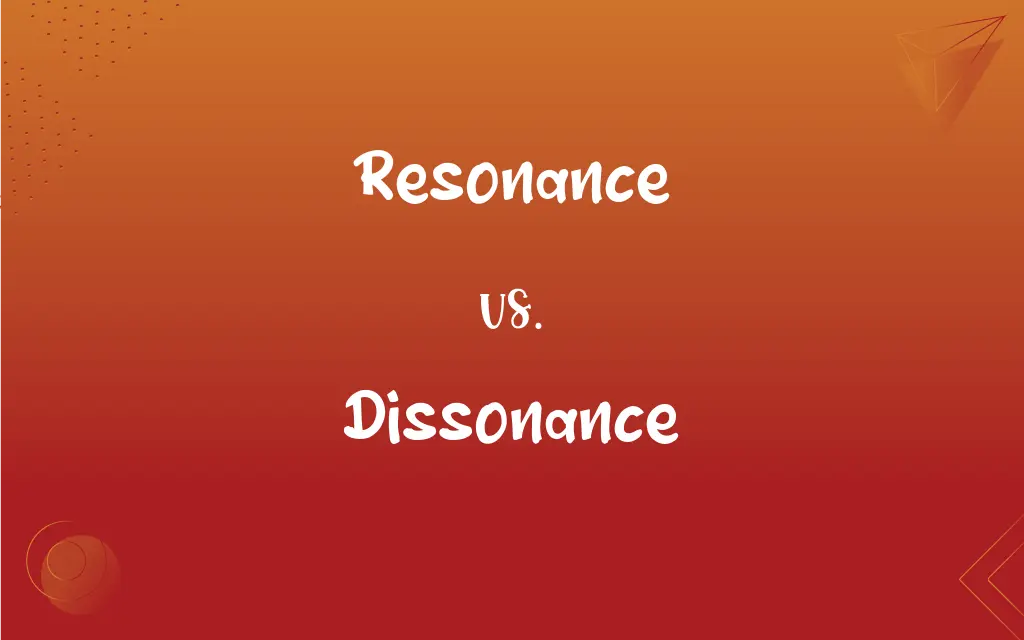Resonance vs. Dissonance: What's the Difference?
By Janet White || Updated on May 22, 2024
Resonance is the harmonious reinforcement of sound or ideas, while dissonance is the clash or lack of harmony in sound or ideas.

Key Differences
Resonance occurs when sound waves or ideas align harmoniously, amplifying the effect or meaning. In music, resonance enhances sound quality by reinforcing certain frequencies. In broader contexts, resonance refers to ideas or emotions that deeply connect with individuals or groups. Dissonance, on the other hand, describes a lack of harmony or a clash between sounds or ideas. In music, dissonance creates tension through conflicting notes. In general contexts, dissonance refers to cognitive or emotional conflict, often causing discomfort or a need for resolution.
Resonance in physics involves the amplification of sound waves when they match the natural frequency of an object, leading to a fuller and more vibrant sound. Dissonance in music results from notes that do not harmonize, creating a sense of instability that often seeks resolution.
Resonance in communication and literature indicates that a message or theme has a profound and lasting impact on its audience. Dissonance in psychology refers to the mental discomfort experienced when holding contradictory beliefs or values, prompting a desire to reduce the inconsistency.
Resonance can create a sense of unity and agreement, making ideas or sounds more appealing and impactful. Dissonance often leads to critical thinking and change by challenging existing beliefs and creating a sense of urgency to resolve conflicts.
Resonance is associated with positive reinforcement and amplification, while dissonance is linked with conflict and the need for resolution. Both concepts play crucial roles in various fields, from music and physics to psychology and communication.
ADVERTISEMENT
Comparison Chart
Definition
Harmonious reinforcement of sound/ideas
Lack of harmony or clash in sound/ideas
Contexts
Music, physics, communication
Music, psychology, communication
Musical Example
Amplification of certain frequencies
Clashing notes creating tension
Emotional Impact
Deep connection, positive reinforcement
Conflict, mental discomfort
Effect in Communication
Profound and lasting impact
Promotes critical thinking and change
ADVERTISEMENT
Psychological Aspect
Unity and agreement
Cognitive dissonance, need for resolution
Resonance and Dissonance Definitions
Resonance
The reinforcement of sound by synchronous vibration.
The resonance of the singer's voice filled the concert hall beautifully.
Dissonance
A clash or conflict between different elements.
The dissonance between his words and actions was unsettling.
Resonance
The quality of evoking a strong response or connection.
Her speech had a deep resonance with the audience.
Dissonance
A lack of harmony between musical notes.
The composer's use of dissonance created a tense atmosphere.
Resonance
In literature or communication, the ability to evoke shared emotions or ideas.
The novel's themes had a lasting resonance with readers.
Dissonance
The tension resulting from conflicting ideas or interests.
The debate highlighted the dissonance within the group.
Resonance
Intensification and prolongation of sound, especially of a musical tone, produced by sympathetic vibration.
Dissonance
Mental discomfort from holding contradictory beliefs.
She experienced cognitive dissonance after learning the truth.
Resonance
Intensification of vocal tones during articulation, as by the air cavities of the mouth and nasal passages.
Dissonance
The quality of being inharmonious or discordant.
The painting's colors created a visual dissonance.
Resonance
(Medicine) The sound produced by diagnostic percussion of the normal chest.
Dissonance
A harsh, disagreeable combination of sounds; discord.
Resonance
Richness or significance, especially in evoking an association or strong emotion
"Israel, gateway to Mecca, is of course a land of religious resonance and geopolitical significance" (James Wolcott).
Dissonance
Lack of agreement, consistency, or harmony; conflict
"In Vietnam, reality fell away and dissonance between claim and fact filled the void" (Michael Janeway).
Resonance
(Physics) The increase in amplitude of oscillation of an electric or mechanical system exposed to a periodic force whose frequency is equal or very close to the natural undamped frequency of the system.
Dissonance
(Music) A combination of tones contextually considered to suggest unrelieved tension and require resolution.
Resonance
(Physics) A subatomic particle having too short a lifetime to be observed directly and whose existence is inferred from a peak in the energy distribution of its decay products.
Dissonance
A harsh, discordant combination of sounds.
Resonance
(Chemistry) The property of a compound having simultaneously the characteristics of two or more structural forms that differ only in the distribution of electrons. Such compounds are highly stable and cannot be properly represented by a single structural formula.
Dissonance
(music) Conflicting notes that are not overtones of the note or chord sounding.
Resonance
(uncountable) The quality of being resonant.
Dissonance
A state of disagreement or conflict.
Resonance
(countable) A resonant sound, echo, or reverberation, such as that produced by blowing over the top of a bottle.
Dissonance
(countable) An instance of disharmony or disjunction; a clash.
Resonance
(medicine) The sound produced by a hollow body part such as the chest cavity upon auscultation, especially that produced while the patient is speaking.
Dissonance
A mingling of discordant sounds; an inharmonious combination of sounds; discord.
Filled the air with barbarous dissonance.
Resonance
(figuratively) Something that evokes an association, or a strong emotion; something that strikes a chord.
Emotional resonance
Dissonance
Want of agreement; incongruity.
Resonance
(physics) The increase in the amplitude of an oscillation of a system under the influence of a periodic force whose frequency is close to that of the system's natural frequency.
Dissonance
A conflict of people's opinions or actions or characters
Resonance
(nuclear physics) A short-lived subatomic particle or state of atomic excitation that results from the collision of atomic particles.
Dissonance
The auditory experience of sound that lacks musical quality; sound that is a disagreeable auditory experience;
Modern music is just noise to me
Resonance
An increase in the strength or duration of a musical tone produced by sympathetic vibration.
Dissonance
Disagreeable sounds
Resonance
(chemistry) The property of a compound that can be visualized as having two structures differing only in the distribution of electrons.
Resonance
(astronomy) A influence of the gravitational forces of one orbiting object on the orbit of another, causing periodic perturbations.
Resonance
(electronics) The condition where the inductive and capacitive reactances have equal magnitude.
Resonance
(sociology) A quality of human relationship with the world.
Resonance
The act of resounding; the quality or state of being resonant.
Resonance
A prolongation or increase of any sound, either by reflection, as in a cavern or apartment the walls of which are not distant enough to return a distinct echo, or by the production of vibrations in other bodies, as a sounding-board, or the bodies of musical instruments.
Resonance
A phenomenon in which a vibration or other cyclic process (such as tide cycles) of large amplitude is produced by smaller impulses, when the frequency of the external impulses is close to that of the natural cycling frequency of the process in that system.
Resonance
An electric phenomenon corresponding to that of acoustic resonance, due to the existance of certain relations of the capacity, inductance, resistance, and frequency of an alternating circuit; the tuning of a radio transmitter or receiver to send or detect waves of specific frequencies depends on this phenomenon.
Resonance
An excited state of a stable particle causing a sharp maximum in the probability of absorption of electromagnetic radiation
Resonance
A vibration of large amplitude produced by a relatively small vibration near the same frequency of vibration as the natural frequency of the resonating system
Resonance
Having the character of a loud deep sound; the quality of being resonant
Resonance
Relation of mutual understanding or trust and agreement between people
Resonance
The quality imparted to voiced speech sounds by the action of the resonating chambers of the throat and mouth and nasal cavities
Resonance
A phenomenon where an object vibrates at its natural frequency due to external vibrations.
The bridge's collapse was caused by mechanical resonance.
Resonance
The amplification of a sound wave when it matches an object's natural frequency.
The guitar's body enhances the resonance of the strings.
FAQs
What is resonance in music?
Resonance in music refers to the reinforcement and amplification of certain frequencies, enhancing the sound quality.
How does resonance affect communication?
Resonance in communication creates a deep and lasting impact, making messages more memorable and influential.
What causes dissonance in psychology?
Cognitive dissonance arises when a person holds conflicting beliefs or values, causing mental discomfort.
What is dissonance in music?
Dissonance in music refers to a combination of notes that clash, creating tension and a sense of instability.
Can resonance occur in non-musical contexts?
Yes, resonance can occur in communication, literature, and physics, referring to the amplification of impact or vibrations.
How is dissonance used in art?
Dissonance in art can create tension and provoke thought, challenging viewers to consider different perspectives.
Can dissonance be resolved?
Yes, dissonance often seeks resolution, either by changing beliefs, acquiring new information, or finding harmony.
Why is dissonance important in music?
Dissonance is important in music for creating tension and drama, which can make compositions more dynamic and interesting.
Can resonance be measured?
Yes, resonance can be measured in terms of frequency and amplitude in physics.
How do composers use dissonance?
Composers use dissonance to create tension, interest, and to drive musical resolution.
What is an example of resonance in everyday life?
An example of resonance is when a motivational speech deeply inspires and moves an audience.
What is social resonance?
Social resonance refers to the widespread impact and shared understanding of an idea or movement within a community.
Can dissonance be positive?
Yes, dissonance can be positive by encouraging critical thinking, growth, and change.
How does resonance relate to emotions?
Resonance relates to emotions by evoking strong, shared feelings or responses in individuals.
What is mechanical resonance?
Mechanical resonance occurs when an object vibrates at its natural frequency due to external forces, often leading to amplification of motion.
Can resonance occur in architecture?
Yes, architectural resonance can occur when buildings vibrate due to external forces matching their natural frequency, potentially causing structural issues.
How does dissonance affect decision-making?
Dissonance can lead to indecision and discomfort, prompting individuals to change their beliefs or actions to resolve the conflict.
What is the opposite of resonance?
The opposite of resonance is dissonance, which refers to lack of harmony or conflict.
How can resonance enhance storytelling?
Resonance in storytelling makes themes and messages more impactful, creating a lasting emotional connection with the audience.
What is an example of cognitive dissonance?
Cognitive dissonance occurs when someone feels discomfort after acting against their values, like a smoker knowing the health risks but continuing to smoke.
About Author
Written by
Janet WhiteJanet White has been an esteemed writer and blogger for Difference Wiki. Holding a Master's degree in Science and Medical Journalism from the prestigious Boston University, she has consistently demonstrated her expertise and passion for her field. When she's not immersed in her work, Janet relishes her time exercising, delving into a good book, and cherishing moments with friends and family.































































